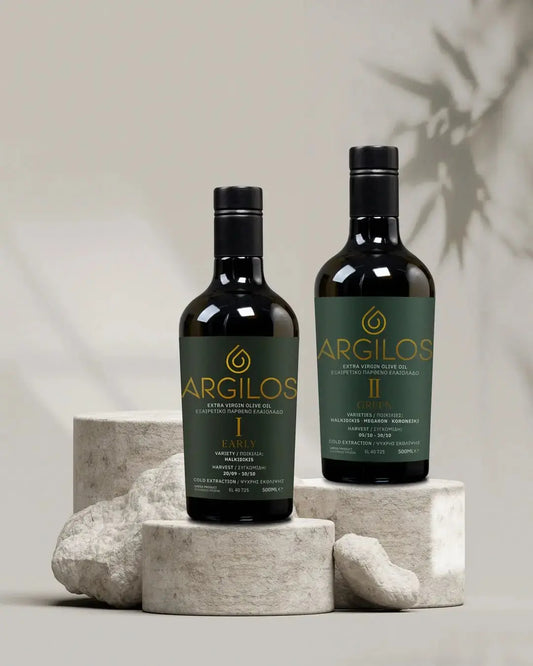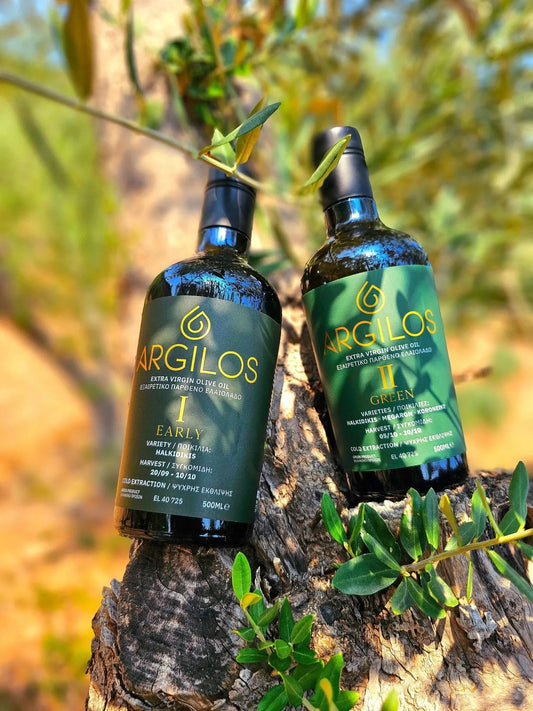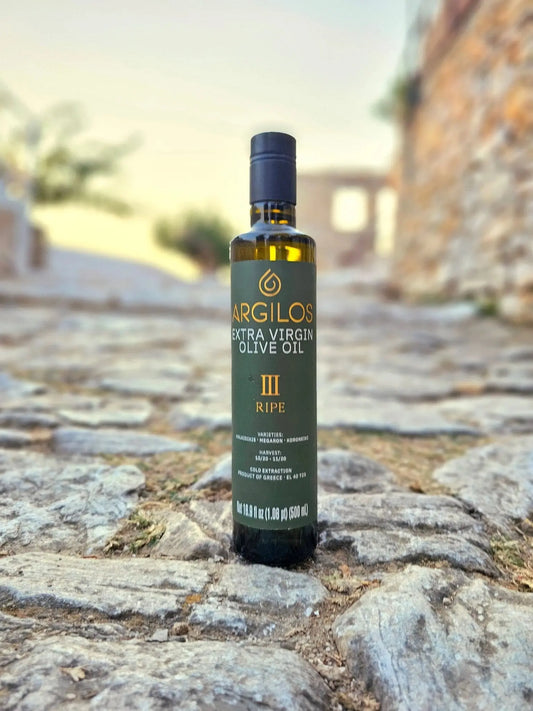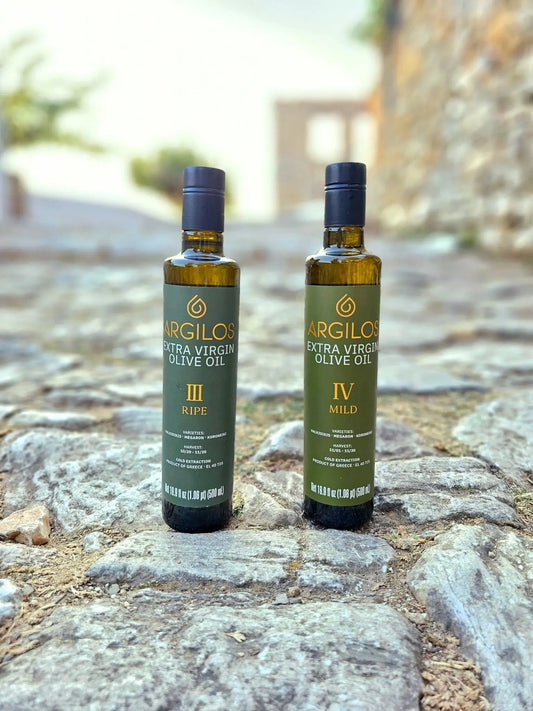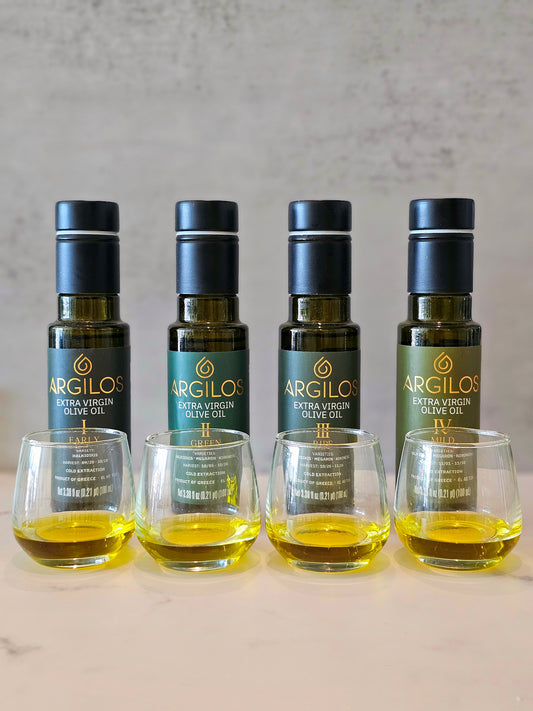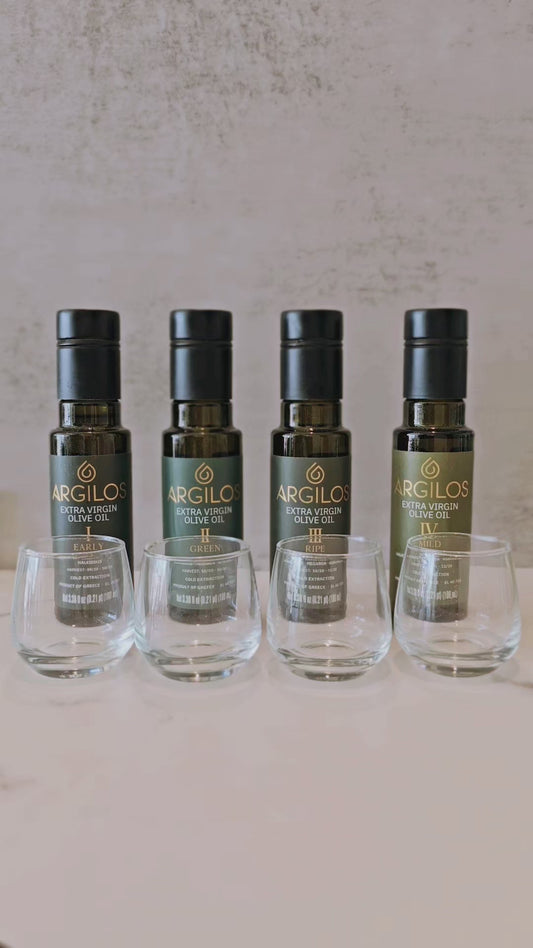Health Benefits of Greek Olive Oil: What Science Says About Heart & Brain Health
Share
The Science Behind Greek Olive Oil and Cardiovascular Health
For millennia, Greek olive oil has been more than a culinary staple—it represents a cornerstone of the Mediterranean lifestyle and diet. Contemporary scientific research continues to validate what ancient civilizations intuitively understood: this golden elixir offers remarkable cardiovascular benefits. Clinical studies demonstrate that the polyphenols abundant in authentic Greek extra virgin olive oil (EVOO) directly impact arterial health by reducing inflammation markers and improving endothelial function. The monounsaturated fatty acids (MUFAs) present in premium Greek olive oil, particularly oleic acid, play a pivotal role in maintaining healthy cholesterol profiles by simultaneously lowering low-density lipoprotein (LDL) while preserving high-density lipoprotein (HDL) levels.
Mount Pangaion in Kavala, Greece—home to Argilos EVOO—provides ideal conditions for cultivating olives with exceptional cardiovascular-protective properties. The unique microclimate and mineral-rich soil contribute to the development of olives with significantly higher phenolic compounds than those grown in less optimal environments. These compounds, including oleocanthal and oleuropein, exhibit potent anti-inflammatory and antioxidant effects comparable to low-dose aspirin therapy without the associated side effects. The cardioprotective benefits of these compounds become more pronounced when the oil is cold-pressed within hours of harvest—a traditional practice meticulously maintained by heritage producers.
Oleocanthal: Nature's Anti-Inflammatory Agent
Among the bioactive compounds in premium Greek olive oil, oleocanthal merits special attention. This natural phenolic compound creates the characteristic peppery sensation experienced at the back of the throat when consuming high-quality EVOO. Research published in the Journal of Agricultural and Food Chemistry reveals that oleocanthal operates through similar biochemical pathways as ibuprofen, inhibiting cyclooxygenase (COX) enzymes that trigger inflammation. Regular consumption of oleocanthal-rich Greek olive oil may provide cumulative anti-inflammatory effects that protect arterial walls from inflammatory damage—a primary contributor to atherosclerosis development.
The oleocanthal concentration varies significantly between olive varieties and production methods. Early-harvest Greek olive oils, like those from the initial Argilos pressings, contain substantially higher oleocanthal levels, delivering more pronounced anti-inflammatory benefits. This explains why connoisseurs often experience a stronger throat "burn" with premium early-harvest Greek olive oils—a sensory indicator of superior therapeutic potential.
Cognitive Benefits of Greek Olive Oil Consumption
The human brain, composed of nearly 60% fat, thrives on the type of high-quality fats found in authentic Greek olive oil. Neurological research increasingly supports a connection between consistent consumption of high-polyphenol olive oil and enhanced cognitive function. The neuroprotective properties stem from multiple mechanisms: antioxidant activity that neutralizes free radicals, anti-inflammatory effects that reduce neuroinflammation, and improved cerebral microcirculation.
Long-term observational studies tracking Mediterranean populations consuming substantial quantities of Greek olive oil report lower incidences of age-related cognitive decline and neurodegenerative conditions. The PREDIMED study, a landmark randomized clinical trial, demonstrated that participants following a Mediterranean diet enriched with extra virgin olive oil exhibited improved cognitive function compared to control groups. Specifically, memory, executive function, and processing speed showed measurable preservation among regular EVOO consumers.
Blood-Brain Barrier Protection
A particularly fascinating aspect of Greek olive oil's neuroprotective capacity involves its ability to strengthen the blood-brain barrier (BBB). This specialized interface shields the brain from potentially harmful substances while allowing essential nutrients to pass through. Research published in the Journal of Alzheimer's Disease indicates that olive oil polyphenols may help maintain BBB integrity, which often becomes compromised with age and in neurodegenerative conditions.
The tyrosol and hydroxytyrosol compounds prevalent in high-quality Greek olive oil demonstrate remarkable ability to cross the BBB themselves, delivering antioxidant protection directly to neural tissues. This mechanism provides a biological explanation for the observed association between traditional Greek diets rich in authentic olive oil and reduced dementia risk.
"The combination of polyphenols found in traditional Greek olive oil represents one of nature's most sophisticated neuroprotective formulations. These compounds work synergistically in ways we're only beginning to understand." — Dr. Eleni Melliou, University of Athens, Department of Pharmacognosy
Metabolic Advantages of Greek Olive Oil
Beyond its cardiovascular and neurological benefits, premium Greek olive oil positively influences metabolic health—a critical factor in overall wellbeing. Contrary to common misconceptions about dietary fats, the specific lipid profile of authentic Greek olive oil actually supports metabolic equilibrium. Regular consumption correlates with improved insulin sensitivity and glucose metabolism, making it a valuable dietary component for those concerned about metabolic syndrome and type 2 diabetes.
The phenolic compounds in Greek olive oil activate AMPK (adenosine monophosphate-activated protein kinase), a metabolic regulator that enhances cellular energy utilization and fat oxidation. This biochemical pathway explains why populations consuming traditional Mediterranean diets centered around authentic olive oil maintain healthier body composition despite relatively high fat intake. Furthermore, Greek olive oil consumption appears to positively modulate the gut microbiome—the complex ecosystem of intestinal bacteria that influences numerous aspects of metabolism and immune function.
Weight Management Potential
Perhaps counterintuitively, incorporating high-quality Greek olive oil into daily nutrition may support weight management efforts. Several mechanisms contribute to this effect: enhanced satiety through gastric hormone stimulation, improved metabolic rate, and optimized fat oxidation. A study published in the European Journal of Nutrition found that an olive oil-enriched diet resulted in greater weight loss compared to a lower-fat diet with equivalent caloric content.
The squalene component in Greek olive oil deserves particular attention for its metabolic benefits. This rare natural compound, concentrated in olive oil from specific Greek regions including Mount Pangaion, demonstrates lipid-regulating properties that help normalize cholesterol synthesis and transport. The bioavailability of squalene reaches its peak in cold-pressed, unfiltered olive oils produced through traditional methods.
Selecting Authentic Greek Olive Oil for Maximum Health Benefits
Harvesting period significantly influences the therapeutic potential of Greek olive oil. Early-harvest oils, though typically more expensive and lower-yielding, contain substantially higher concentrations of beneficial polyphenols compared to late-harvest varieties. The intense, robust flavor profile of early-harvest oil signals its rich polyphenol content—the slight bitterness and peppery finish represent tangible evidence of these compounds. Conversely, mild late-harvest oils, while more approachable palatally, generally offer reduced polyphenol concentrations.
For consumers seeking maximum health benefits, understanding authentication markers becomes essential. Legitimate Greek olive oil producers embrace transparency through traceability systems, harvest dating, and comprehensive chemical analysis. Authentication technologies like QR codes linking to production documentation provide assurance of origin and processing methods. Single-estate oils offer additional advantages by reflecting consistent terroir influences and production standards.
Storage and Culinary Applications
Preserving the bioactive compounds in Greek olive oil requires proper storage conditions. Exposure to light, heat, and oxygen accelerates degradation of the beneficial polyphenols. Optimal storage involves dark glass containers kept in cool, dark locations away from heat sources. From a health optimization perspective, consuming unheated olive oil maximizes polyphenol intake, as thermal processing can diminish certain compounds.
| Culinary Application | Health Benefit Preservation | Recommended Oil Intensity |
|---|---|---|
| Raw drizzling (salads, vegetables) | Maximum preservation of all bioactive compounds | Early-harvest intense or medium-intensity |
| Low-temperature cooking (below 300°F) | Good preservation of most compounds | Medium-intensity |
| High-temperature cooking | Partial degradation of sensitive compounds | Late-harvest mild |
Frequently Asked Questions About Greek Olive Oil and Health
- How much Greek olive oil should I consume daily for health benefits?
- Research suggests 2-3 tablespoons (25-40 ml) daily provides optimal cardiovascular and neurological benefits while remaining calorie-appropriate for most individuals.
- Does cooking with Greek olive oil destroy its health benefits?
- While some heat-sensitive compounds diminish during cooking, many remain stable at typical cooking temperatures. For maximum benefit, reserve a portion of your premium Greek olive oil for raw applications.
- Can Greek olive oil help reduce inflammation from autoimmune conditions?
- Preliminary research indicates the anti-inflammatory compounds in high-polyphenol Greek olive oil may complement conventional treatments for certain inflammatory conditions, though consultation with healthcare providers remains essential.
- How can I verify if my Greek olive oil is authentic?
- Look for transparent producers who provide harvest dates, acidity levels, and polyphenol content. Products with traceability systems, such as QR codes linking to production documentation, offer additional authenticity assurance.
The scientific evidence supporting Greek olive oil's health benefits continues to expand, affirming what generations of Mediterranean inhabitants have understood through observation and tradition. As modern research techniques reveal the biochemical mechanisms behind these benefits, we gain a deeper appreciation for this extraordinary natural product. By selecting authentic, high-quality Greek olive oil from responsible producers who maintain traditional harvesting and processing methods, consumers can incorporate this powerful functional food into their daily nutrition for substantial long-term health advantages.
References
-
Exploring the Cardiovascular Benefits of Extra Virgin Olive Oil. PMC. Published 2025 Feb 13. https://pmc.ncbi.nlm.nih.gov/articles/PMC11852600/
Exploring the Benefits of Extra Virgin Olive Oil on Cardiovascular Health. PubMed. Published 2025 May 27. https://pubmed.ncbi.nlm.nih.gov/40507112/
Olive Oil and Heart Health. Yale School of Medicine. Published 2022 Oct 31. https://medicine.yale.edu/news-article/olive-oil-and-heart-health/
Protective Effects of Oleic Acid and Polyphenols in Extra Virgin Olive Oil. ScienceDirect. https://www.sciencedirect.com/science/article/pii/S2213453023001684
Effect of Olive Oil Consumption on Cardiovascular Disease, Cancer, and Mortality. ScienceDirect. https://www.sciencedirect.com/science/article/pii/S0261561422003557
Olive Polyphenols: Antioxidant and Anti-Inflammatory Properties. PMC. Published 2021 Jun 28. https://pmc.ncbi.nlm.nih.gov/articles/PMC8300823/
The Effects of Olive Oil Consumption on Cognitive Performance. Frontiers in Nutrition. Published 2023 Oct 10. https://www.frontiersin.org/journals/nutrition/articles/10.3389/fnut.2023.1218538/full
The Clinical Impact of an Extra Virgin Olive Oil Enriched Diet. PMC. Published 2022 Aug 3. https://pmc.ncbi.nlm.nih.gov/articles/PMC9386289/
Oleocanthal 101: A Scientific Review of the Health Benefits. Kyoord. Published 2024 Oct 25. https://kyoord.com/blogs/learn/oleocanthal-101-a-scientific-review-of-its-anti-inflammatory-anti-cancer-and-neuroprotective-benefits
Extra-Virgin Olive Oil Enhances the Blood–Brain Barrier Function. PMC. Published 2022 Nov 30. https://pmc.ncbi.nlm.nih.gov/articles/PMC9736478/
Olive Oil - Alzheimer's Drug Discovery Foundation. PDF. https://www.alzdiscovery.org/uploads/cognitive_vitality_media/Olive-Oil-Cognitive-Vitality-For-Researchers.pdf
On the Squalene Content of CV Chondrolia Chalkidikis. PMC. Published 2021 Oct 2. https://pmc.ncbi.nlm.nih.gov/articles/PMC8512499/
Unraveling the Extra Virgin Olive Oil Effect on Inflammation. PMC. Published 2025 Feb 25. https://pmc.ncbi.nlm.nih.gov/articles/PMC11940808/
Neuroprotective Effects of Olive Oil: A Comprehensive Review. PMC. Published 2024 Jun 23. https://pmc.ncbi.nlm.nih.gov/articles/PMC11274152/
Daily Use of Extra Virgin Olive Oil with High Oleocanthal. PubMed. Published 2020 Oct 1. https://pubmed.ncbi.nlm.nih.gov/33023123/
Oleocanthal, a Phenolic Derived from Virgin Olive Oil. PMC. Published 2014 Jul 10. https://pmc.ncbi.nlm.nih.gov/articles/PMC4139846/
Assistant Professor Tassos C. Kyriakides discusses cognitive benefits of Olive Oil. Yale University. Published 2022 Dec 20. https://ysph.yale.edu/news-article/assistant-professor-tassos-c-kyriakides-discusses-the-cognitive-benefits-of-olive-oil/
Mediterranean Diet and Age-Related Cognitive Decline. JAMA Internal Medicine. Published 2015 Jun 30. https://jamanetwork.com/journals/jamainternalmedicine/fullarticle/2293082
Antioxidants in Greek Virgin Olive Oils. PMC. Published 2014 May 12. https://pmc.ncbi.nlm.nih.gov/articles/PMC4665486/
Network Meta-Analysis of Metabolic Effects of Olive-Oil in Humans. Frontiers in Nutrition. Published 2019 Feb 11. https://www.frontiersin.org/journals/nutrition/articles/10.3389/fnut.2019.00006/full


